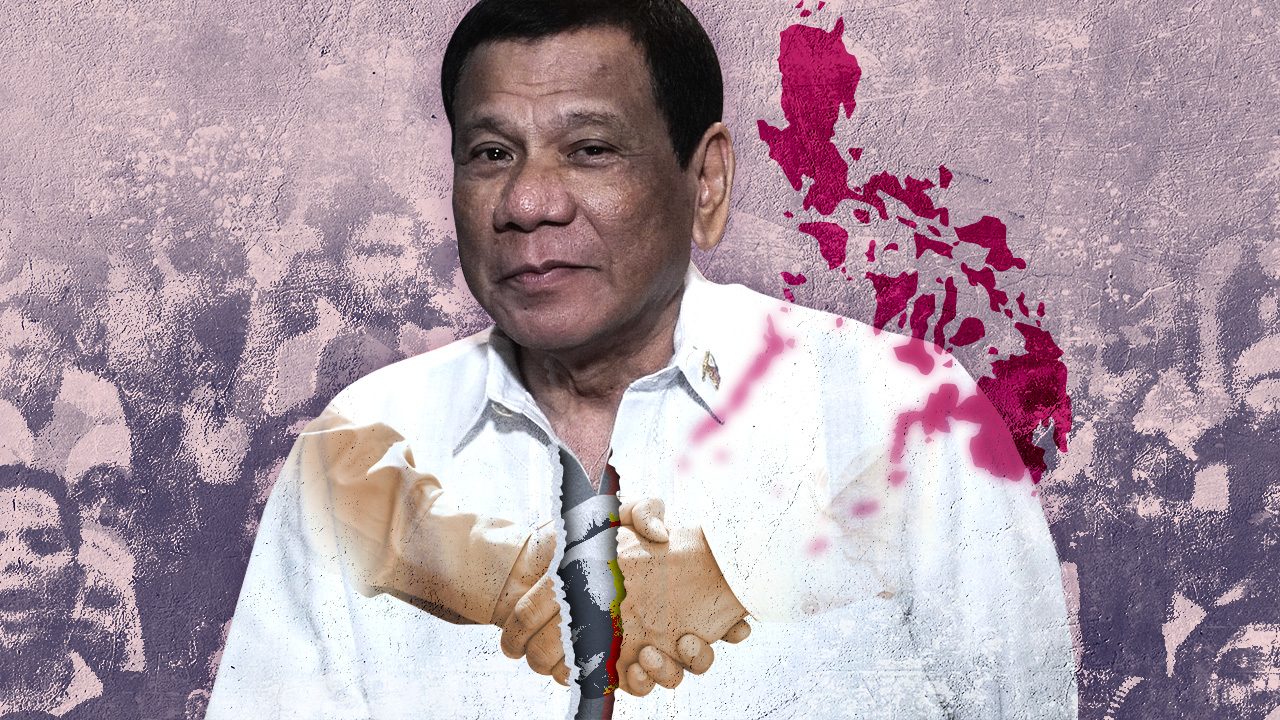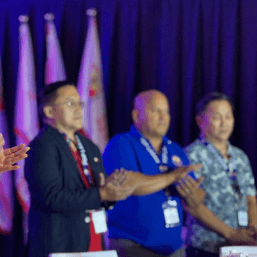SUMMARY
This is AI generated summarization, which may have errors. For context, always refer to the full article.

Former Senate president Aquilino “Nene” Pimentel Jr. died with a broken heart in late 2019 because President Rodrigo Duterte abandoned their political party’s federalism initiative, one of the late statesman’s closest and trusted followers in Cagayan de Oro said.
“He (Duterte) promised Senator Nene (Pimentel Jr.) and Filipinos that he will make the Philippines a nation with federal states. That was why we campaigned hard for him, most especially Senator Nene,” said Welvert Cuenca, secretary-general of the Cagayan de Oro council of the ruling Partido Demokratiko Pilipino-Lakas ng Bayan (PDP-Laban).
It was a promise so important, especially for many Mindanaoans like Pimentel, who felt that they were left out of the government’s development efforts for decades.
Duterte capitalized on that during his presidential campaign, projecting himself as a Mindanaoan messiah who was destined to change the status quo and deliver Mindanao from the bondage of social and economic marginalization as soon as he rose to power.
The 85-year-old Pimentel died of lymphoma on October 20, 2019, barely four months after Duterte made a turnabout by announcing he had given up on the federalism initiative, and instead, urged Congress to go work on changing the 1987 Constitution.
That presidential pronouncement hurt Pimentel who had championed federalism during his entire political career, and who, even in his retirement, organized seminars and advocated federalism in various fora, according to Cuenca.
Duterte was Pimentel’s federalism champion, and in the President, the late senator saw his last best hope that he would live to see the day when the Philippines would become a federal republic.
The President, after all, was his “creation” – Duterte began his long career in politics after being turned into officer-in-charge of Davao City’s Office of the Vice Mayor in 1986 by Pimentel, then the interior secretary of Corazon Aquino’s post-EDSA Revolution government.
Cuenca said, “The old man campaigned very hard (for Duterte in 2016), believing his dream of Federal Philippines will become a reality.”
Duterte ‘lied’
Cuenca, too, expressed his frustration. He had no kind words for Duterte who, he said, “lied” about his 2016 election promise.
He said that when Duterte announced in mid-2019 that he would no longer fulfill his promise, “nagluya si Senator Nene kay nahugno ug nawala ang iyang damgo sa federal Philippines (Senator Nene lost his energy because his dream of a federal Philippines was shattered),” he said.
Cuenca said Pimentel had kept his frustration to himself, but it was obvious to his long-time supporters and those who knew the former senator well that he was hurting inside.
“It was the root cause of his death for hopelessness became his everyday chore. Hopelessness kills,” Cuenca said.
He said the closest Pimentel got in his years of federalism advocacy was the Local Government Code of 1991 and the law that created the precursor of the Bangsamoro Autonomous Region in Muslim Mindanao (BARMM) – laws the late senator authored to give local governments more powers and revenue share from the national coffers.
Pimentel was a member of the 22-member Consultative Committee (Con-Com), led by former chief justice Reynato Puno, which Duterte created to draft a proposed federal constitution for five months in 2018.
Cuenca said Pimentel was in high spirits, and even sat down to work again with his estranged political ally and friend, former Cagayan de Oro mayor Reuben Canoy, and other Duterte appointees to the committee. Before that, Pimentel and Canoy, another federalism advocate, had not seen eye to eye for years due to political and personal reasons.
The Con-Com recommended a constitution for 18 federated regions, including the Bangsamoro and Cordillera areas, under a federal-presidential form of government. Duterte abandoned that proposal a year later.
Too late
Cagayan de Oro 2nd district Representative Rufus Rodriguez, another federalism advocate, said Duterte would not be able to fulfill that 2016 promise even if he changed his mind now.
With Duterte serving his last full year in office, a shift to federalism would be “too late,” said Rodriguez, who filed bills in the lower House that sought only political and economic reforms in the Constitution, in line with his version of federalism.
Rodriguez said politicians in Luzon and big businesses put up a strong resistance to the proposed shift to a federal form of government.
“There is resistance too in the Senate because many of its members didn’t want senators to get elected by region,” he said. “It was really beyond the control of the President.”
Rodriguez said he noted that Duterte stopped talking about his federalism initiative in 2019 and that he did not even say a word about it during his fourth State of the Nation Address (SONA) that same year.
Rodriguez said he too was upset because federalism was a key feature in Duterte’s successful presidential campaign in 2016, and the President repeatedly spoke about it during his previous SONAs.
In a 2019 interview, Rodriguez told reporters in Cagayan de Oro: “Federalism was his (Duterte’s) listening tool during his campaign for the presidency. Disappointed ako, og sayang ang panahon nga siya pa ang presidente. Ambot ngano nga mihinay siya karon sa federalism (I’m disappointed because he missed out on this chance during his presidency. I don’t understand why he softened on his federalism position).”
‘Most important promise’
Norodin Alonto Lucman, former deputy governor of the now-defunct Autonomous Region in Muslim Mindanao (ARMM), said federalism was the single most important promise that Duterte gave to Mindanao when he ran for president in 2016.
For predominantly Muslim Lanao del Sur and Marawi City where Lucman comes from, Duterte made no specific promise in 2016, he said.
“There were no promises except federalism which was relegated into a counter-weight called the Bangsamoro Organic Law (BOL),” Lucman said.
Republic Act No. 11054 or the BOL created in 2018 the BARMM, which resulted from the peace agreement between the administration of the late president Benigno “Noynoy” Aquino III and the MILF. It repealed RA 6734 that created the ARMM and expanded the predominantly Muslim region in Mindanao – supposedly as part of Duterte’s federalism proposal.
The BARMM is composed of the cities of Cotabato, Lamitan, and Marawi; the provinces of Basilan, Lanao del Sur, Maguindanao, Sulu, Tawi-tawi; and some villages in Cotabato province.
But for Lucman, the 2018 law merely created a regional hub “that holds no promise of peace and stability.”
He said the BARMM has been anchored on a so-called normalization process, and decommissioning of former Moro Islamic Liberation Front (MILF) rebels “that need more time to realize because both sides (government and MILF) are acting in bad faith.”
The entire process entails putting in place measures for building confidence, demobilization of MILF members, turning their camps into productive and law-abiding communities, and institutionalizing a justice system in the predominantly Muslim autonomous region.
“It is a cultural anomaly,” said Lucman who pointed out that the BARMM has remained under the Office of the President, “if you call that Bangsamoro autonomy.”
Many of the former MILF rebels were becoming impatient because the government has yet to deliver the full socio-economic dole outs promised them so they could start over.
Lucman said BARMM, Duterte’s supposed precedent for federalism, is a ticking time bomb.
“[The] MILF is buying time enough to replenish its arsenals against internal enemies while the AFP (Armed Forces of the Philippines) is modernizing its counter-insurgency weapons in time for a change in government in 2022. Promises are meant to be broken because the whole process of disengagement is [based on] how far the government can extend a sustainable dole out to appease the former combatants until 2022,” he said.
Lucman added, “BARMM is like a mine that people in Manila pass and juggle around like a plaything; a milking cow since 1989.”
BARMM’s “internal enemies,” he said, are the Bangsamoro Islamic Freedom Fighters (BIFF), political clans, the Moro National Liberation Front (MNLF), and former MILF combatants.
They “are Murad’s internal blood enemies,” said Lucman, referring to MILF leader and BARMM Chief Minister Murad Ebrahim.
Also, Lucman said, the next administration and the BARMM leadership would have a tough time clearing the mess caused by the 2017 Marawi siege, and the autonomous region in general.
“Where previous presidents failed…and so with Duterte, who engaged in a half-baked scorched earth policy in Muslim Mindanao. Money cannot buy peace in Mindanao,” Lucman said.
Duterte, he said, “will leave a ton of questions than answers after 2022.”
Zamboanga City Councilor Juan Elago, however, saw the BARMM from a different perspective.
From the point of security, Elago said, the BARMM “actually created a more secure and peaceful Zamboanga.”
He noted that since the government and MILF forged a political settlement in 2018, Zamboanga has been spared from bombings, kidnappings, and ambushes.
“From this point, President Duterte was able to make good his promise,” he said.
Elago also said the Duterte administration freed Zamboanga City from “the specter of being part of the Bangsamoro territory” when it started implementing the 2018 law and its transitory provisions. – with reports from Frencie Carreon/Rappler.com
Add a comment
How does this make you feel?















![[OPINION] Rodrigo Duterte and his ‘unconditional love’ for China](https://www.rappler.com/tachyon/2024/04/rodrigo-duterte-xi-jinping-august-2019.jpeg?resize=257%2C257&crop=91px%2C0px%2C900px%2C900px)



![[The Slingshot] Lito Patay’s 4 hours and 38 minutes of infamy](https://www.rappler.com/tachyon/2024/07/Lito-Patay-4-hours-infamy-July-19-2024.jpg?resize=257%2C257&crop=233px%2C0px%2C720px%2C720px)
There are no comments yet. Add your comment to start the conversation.